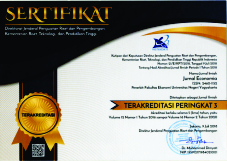The Factors Affecting the Entrepreneurial Intention of College Students
Downloads
Abstract: The Factors Affecting the Entrepreneurial Intention of College Students. The alternative to solve an unemployment problem is to empower the educated person through entrepreneurship programs at colleges that are expected to contribute to employment, thereby reducing unemployment and the burden on the state. This study tested a model that aims to determine the influence of internal locus of control, social support and the need for achievement against in entrepreneurial intention of the student. This study was a cross-sectional. The results show a significant relationship between internal locus of control and social support to the entrepreneurial intention of students. There is a significant relationship between internal locus of control and the need for achievement of students. There is an insignificant relationship between social support and the need for achievement and the last there is a significant relationship between need for achievement and entrepreneurial intention of students.
Keywords: internal locus of control, social support, need for achievement, entrepreneurial intention
Abstrak: Analisis Faktor-Faktor yang Berpengaruh pada Minat Berwirausaha Mahasiswa. Salah satu alternatif untuk memecahkan masalah pengangguran adalah dengan memberdayakan kelompok terdidik melalui program kewirausahaan di perguruan tinggi yang diharapkan mampu berkontribusi dalam penyerapan tenaga kerja sehingga mengurangi pengangguran dan beban negara. Penelitian ini menguji model yang bertujuan untuk mengetahui pengaruh internal locus of control, social support dan need for achievement terhadap minat berwirausaha pada mahasiswa. Penelitian ini termasuk dalam kategori penelitian cross-sectional. Hasil penelitian menunjukkan bahwa terdapat pengaruh internal locus of control dan social support pada minat berwirausaha mahasiswa, terdapat pengaruh internal locus of control terhadap need for achievement mahasiswa, tidak terdapat pengaruh social support pada need for achievement dan yang terakhir terdapat pengaruh need for achievement terhadap minat berwirausaha mahasiswa.
Kata kunci: internal locus of control, social support, need for achievement, entrepreneurial intention
Downloads
Abdillah, W & Jogiyanto, H. M. (2009). Konsep Dan Aplikasi PLS (Partial Least Square) Untuk Penelitian Empiris. Badan Penerbit Fakultas Ekonomi Dan Bisnis. Yogyakarta: UGM.
Adnyana, I.G.L.A. & Purnami, N.M. (2016). Pengaruh Pendidikan Kewirausahaan, Self-Efficacy dan Locus of Control Pada Niat Berwirausaha. E-Jurnal Manajemen Unud, 5(2), 2016.
Hansemark, C.O. (2003). Need for Achievement, Locus of Control and The Prediction of Business Start-Ups: A Longitudinal Study. Journal of Economic Psychology, 24(3), 301-319.
Indari, N. & Rostiani, R. (2008). Intensi Kewirausahaan Mahasiswa: Studi Perbandingan Antara Indonesia, Jepang dan Norwegia. Jurnal Ekonomika dan Bisnis Indonesia, 23(4).
Kautonen. Teemu, Seppo Luoto. (2008). Entrepreneurial Intention in the Third Age: The Impact of Career History. p. 995-1007.
Lee-Kelley, L. (2006). Locus Of Control And Attitudes To Working In Virtual Teams. International Journal of Project Management, 24(3), 234-243.
Leon J.A, Descals, F.J, Dominguez, J.F. (2007). The Psychosocial Profile Of The University Entrepreneur. Journal of Psychology in Spain, 11(1), 72-84.
Moorhead, G. & Griffin, R.W. (2013). Perilaku Organisasi. Jakarta: Salemba Empat.
Oktabriyantina, W., Sudarmanto, R.G., Pujiati. (2014). Hubungan Locus of Control dan Motivasi Berprestasi dengan Self Efficacy dan Minat Berwirausaha. Jurnal Edukasi Ekobis 2(1).
Ozaralli, N. & Rivenburgh, N.K. (2016). Entrepreneurial Intention: Antecedents to Entrepreneurial Behavior In The U.S.A. And Turkey. Journal of Global Entrepreneurship Research, 6(3).
Parsa, K. (2011). A Model of Critical Psychological Factors Influencing Entrepreneurship Development in Iran Small and Medium-Scale Industries. European Journal of Scientific Research. 51(3), 383-395.
Ramayah, T. & Harun. (2005). Entrepreneurial Intention Among the Student of University Sains Malaysia (USM). International Journal of Management and Entrepreneurship, 1: 8-20.
Rauch, A & Frese, M. (2000). A Meta-Analysis on the Relationship between Business Owners' Personality Traits, Business Creation, and Success. European Journal of Work and Organizational Psychology
Riipinen, M. (1994). Extrinsic Occupational Needs and the Relationship Between Need for Achievement and Locus of Control. The Journal of Psychology 128(5).577-287.
Sarafino, E.P. (1994). Health Psychology (2.Ed). New York: Willey.
Sekaran, U. (2006). Research Method Business. Hermitage Publishing Services
Setiadi, U. (2008). Suatu Pemikiran Mengenai Pendekatan Kembali Antara Dunia Pendidikan S1 Manajemen Dengan Dunia Kerja. Prosiding Konferensi Merefleksi Domain Pendidikan Ekonomi dan Bisnis. Salatiga.
Smet, B .(1994). Psikologi Kesehatan. Jakarta: PT. Grasindo.
Taylor, S.E., Peplau, L.A., & Sears, D.O. (1994). Social Psychology. New Jersey: Pretice Hall.
Toding, W.R.B., David, L., & Pali, C. (2015). Hubungan Dukungan Sosial Dengan Motivasi Berprestasi Pada Mahasiswa Angkatan 2013 Fakultas Kedokteran Universitas Sam Ratulangi. Jurnal e-Biomedik (eBm), 3(1).
Urban, B. & Teise, H. (2015). Antecedents to Social Entrepreneurship Intentions: An Empirical Study In South Africa. Management Dynamics, 24(2).
Wiriani, W., Piatrini, S.Y & Ardana. (2013). Efek Moderasi Locus of Control pada Hubungan Pelatihan dan Kinerja pada Bank Perkreditan Rakyat di Kabupaten Badung. Jurnal Ilmiah Akuntansi dan Bisnis, 8(2), 99-105.
Zain, Z.M., Akram, A.M., & Ghani, E.K. (2010). Entrepreneurship Intention Among Malaysian Business Students. Canadian Social Science, 6(3), 34-44.















